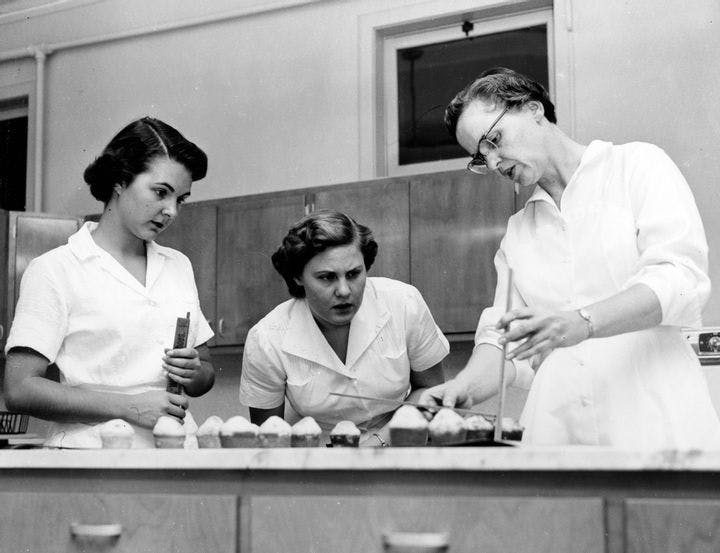Want to break gender stereotypes? Teach boys home economics.
– Erin Amato
It will teach boys a practical skill (and could very well improve America's marriages).
Home economics classes turned women into “a limp, gibbering mass of jelly waiting for marriage,” said radical feminist Robin Morgan in her address to the American Home Economics Association in 1972. Once created to legitimize women’s domestic work, ‘home ec’ classes instead reinforced the sexual division of labor, creating domestic goddess expectations for wives of weary businessmen. Sure enough, the feminists won out: home ec classes became optional or even removed from the curriculum entirely.
But learning to sauté vegetables should earn feminist support, says Rebecca Traister, a senior editor at The New Republic. Traister believes we are wrong to vilify home ec: knowing how to properly set a table or darn a sock may not be such a bad thing. Indeed, says Traister, it should be “rebooted, tweaked, and taught to both boys and girls, across classes and at younger ages than ever before.”
Even though gendered home ec classes are long gone, Traister writes that gendered teaching styles and attitudes toward women in positions of power haven’t evolved. The “second shift” shouldered by women is alive and well today: after working full-time, women are reunited with yesterday’s domesticity as they iron shirts, simmer soup, and shuttle children to and from daycare and soccer practice.
Traister concedes that women’s graduation rates have surpassed that of men’s, yet she is quick to cite the imbalance in household chores as the source of women’s absence from upper-level positions. Despite a 20 percent jump in stay-at-home fathers in recent years, entrenched prejudices are slow to change; society still views a father packing school lunches for his children as emasculating.
The solution? “We need to rewire those attitudes wholesale and early,” advises Traister, “to teach boys from the time they are small that their obligations are to diapering as well as to moneymaking.”
Given that American families must endlessly juggle working and parenting, placing a larger share of household responsibilities on men would open up more doors for middle class families. “Complex domestic obligations might also increase the chances of improving childcare and leave policies,” predicts Traister; the conversation about these issues “wouldn’t just be about women going on about how crucial those policies are.” Moreover, in an economy where men’s wages are stagnating and male unemployment remains above female unemployment by .4 percentage points, Traister believes that home ec would equip young men with a marketable and practical new skillset that could provide a sense of self-worth to help men who feel idle and adrift.
Would young boys benefit? Plenty. Since only a third of boys receive As and Bs in elementary school compared to half of their female counterparts, home ec could provide boys with much-needed focusing skills while including “an element of interpersonal, emotional education” that teaches “how to express affection and disagreement” without physical aggression.
According to Ellen Galinsky of the Families and Work Institute, men face “the increasing pull between their desire — but lack of practice or time — to participate in family life.” This building anxiety causes a poor work-life balance that could be remedied if home ec classes made the household a more familiar locale while teaching the value of open communication of one’s emotions.
The idea of teaching boys “to make banana bread” may as well be blasphemy to traditionalists shocked by the ‘perversions’ of gender role reversal. But there’s a compelling reason why social conservatives could support the idea of home ec for boys; responsible and compassionate men will make for “more appealing mates,” Traister counters, “potentially slowing the disintegration of the two-parent family structure on which conservatives like to pin all of society’s ills.”
In the 21st century era of generational disconnect due to technology and lifestyle differences, what better a way for a father and his children to form a closer relationship than to increase his presence in the home? Even for childless adults, Traister believes self-awareness and communication skills are “a survival technique” beyond depending on a mate for nurturing.
Home ec classes clearly won’t substitute for the economic and social policy changes America may need. But why not teach the tremendous value of housework to both sexes? If cooking is paired with compassion and sautéing paired with self-efficacy, the end result may well be quite appetizing.
The Source: “Kitchen Controversial: Why Feminists Should Embrace Home Economics” by Rebecca Traister. The New Republic, May 28, 2014.
Photo courtesy of San José Library
